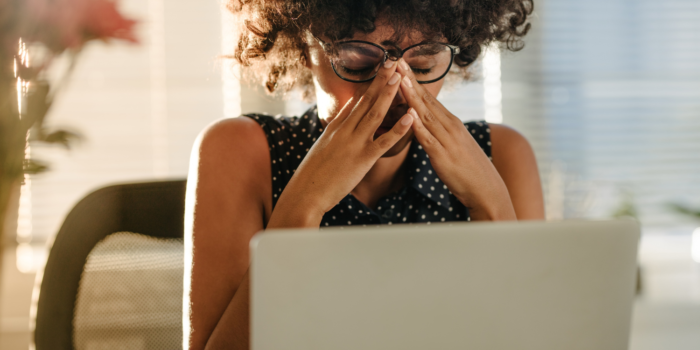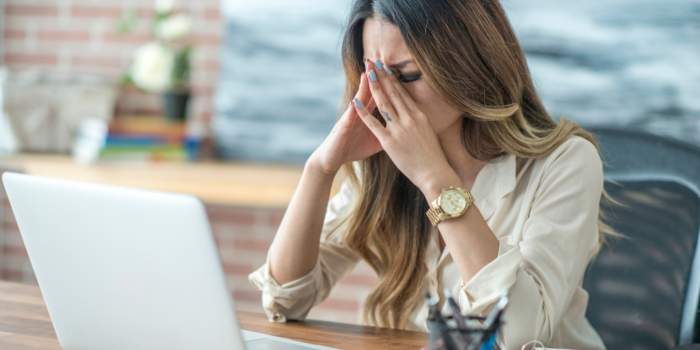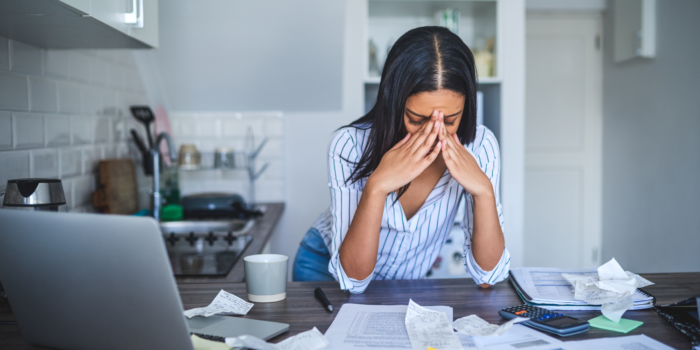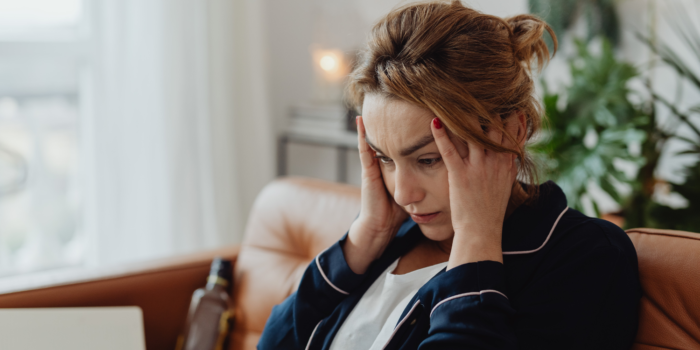What You Need to Know About Anxiety Symptoms in Women

Anxiety is a silent assailant of the mind, affecting everyone differently. In the realm of women’s health, understanding anxiety symptoms is essential for effectively managing and taking control of their mental health. Anxiety symptoms in women can be subtle, often mistaken for stress or fatigue, but their impact on daily life is profound and far-reaching.
The pressure to juggle multiple roles, from work to family to everything else, can heighten feelings of anxiety. With hormonal changes and societal pressures added to the mix, it’s no wonder many individuals, especially women, feel overwhelmed! The expectation to excel at work, maintain a balanced family life, and meet society’s standards can lead to constant stress and anxiety, affecting both our minds and bodies.
Understanding how anxiety presents itself uniquely in women is so important for providing the right support and interventions. In this blog post, we’ll explore how anxiety affects women, take a closer look at both common and uncommon anxiety symptoms in women, the impact of hormonal influences, and consider the role of societal and cultural factors on anxiety.
Disclaimer: This article does not provide medical advice.
The information, including but not limited to, text, graphics, images and other material contained on this article are for informational purposes only. No material on this site is intended to be a substitute for professional medical advice, diagnosis or treatment. Please contact you medical professional or counselor for further information.
Prevalence of Anxiety Among Women
Anxiety disorders are among the most common mental health conditions, significantly affecting women’s health. Research suggests that women are twice as likely as men to be diagnosed with anxiety disorders. A mix of biological, psychological, and social factors influences this difference. Recognizing and understanding this prevalence is crucial for effectively addressing and managing anxiety.
According to the FDA, anxiety disorders are serious mental illnesses that interfere with everyday activities, such as going to work or school or spending time with friends or family. These disorders affect up to 40 million American adults each year. Women are more than twice as likely as men to develop an anxiety disorder in their lifetime. Despite the widespread impact, less than 37% of those suffering receive treatment.
The Anxiety and Depression Association of America (ADAA) reports that anxiety disorders are real, serious medical conditions, just as real and serious as physical disorders like heart disease or diabetes. In the past year, the rate of any anxiety disorder was higher for females (23.4%) than for males (14.3%).
According to the National Institute of Mental Health (NIMH), about 31.1% of U.S. adults experience an anxiety disorder in their lifetime, with women having higher rates than men. Among adolescents aged 13-18, the prevalence of anxiety disorders is even higher for females (38.0%) compared to males (26.1%). This highlights the importance of providing early intervention and support for young women.
Recognizing the significance of these statistics and the far-reaching effects of anxiety disorders on women is essential for effectively addressing and managing your anxiety. By raising awareness and offering support, we can empower those impacted to lead healthier, more satisfying lives.
Common Anxiety Symptoms in Women
Excessive Worrying
Women frequently find themselves caught in a web of worries, fretting over various aspects of life, ranging from concerns about their careers to family responsibilities. This constant worrying, often disproportionate to the actual threat, is a hallmark of anxiety in women. It can lead to a constant state of unease and fear, impacting your daily activities and overall well-being. Over time, this pattern of excessive worrying can create a chronic stress response in your body, contributing to further physical and mental health issues.
Physical Symptoms
Anxiety doesn’t just affect the mind; it impacts the body as well. You may experience a myriad of physical symptoms such as rapid heartbeat, trembling, sweating, and stomach issues like nausea or diarrhea. These manifestations can sometimes mimic other health conditions, leading to confusion and delayed diagnosis. The physical symptoms can also make your anxiety worse, creating a cycle where worrying about the symptoms leads to even more anxiety.
Sleep Disturbances
Constant worry and anxious thoughts can affect sleep quality. Many women find themselves tossing and turning, unable to quiet their minds and get the rest they need. This lack of sleep can make anxiety even worse, leading to fatigue, irritability, and decreased cognitive function. Ongoing sleep disturbances also negatively affect overall health, increasing the risk of other chronic conditions.
Difficulty Concentrating
When feeling anxious, it can be challenging to stay focused on tasks. You may find yourself easily distracted, unable to concentrate on work, or engaging fully in conversations. This mental fog can make anxiety even more distressing, as it can reduce productivity and make it hard to concentrate, adding to your stress and frustration. Difficulty concentrating can also impair your decision-making abilities, which can make it challenging to manage your daily tasks effectively.
Changes in Appetite
Anxiety can impact your appetite, leading to fluctuations in eating habits. At the same time, some women may experience a loss of appetite, while others might find comfort in food and turn to emotional eating. These changes, if left unchecked, can disrupt your nutritional balance and worsen your feelings of anxiety. Emotional eating can lead to weight gain and related health issues, while a loss of appetite can result in weight loss and malnutrition, both of which can place further stress on the body and mind.

Social Withdrawal
The overwhelming nature of anxiety often drives women to retreat into isolation, hiding from the demands of social interaction. But retreating like this can put a strain on relationships and make you feel even more isolated, which only makes the anxiety worse. Social withdrawal can lead to a lack of support from friends and family, making it harder to cope with anxiety. It can also lead to missed opportunities for positive social experiences that could help soothe your anxiety symptoms.
Heightened Sensitivity
When feeling anxious, some women may become more sensitive to their surroundings. Loud noises, crowded spaces, and even seemingly innocent situations can trigger feelings of unease and apprehension, amplifying your sense of vulnerability. This heightened sensitivity can lead to avoidance behaviors, where you may avoid certain places or situations that you perceive as threatening, limiting your daily activities and experiences.
Perfectionism
Many women often find themselves striving for perfection while dealing with anxiety. Although this pursuit of perfection can lead to accomplishments, it can also contribute to feelings of anxiety. The fear of failure is a silent obsession and may drive you to set unrealistically high standards for yourself in different areas of your life. The ongoing pressure to meet these high standards can create constant stress, feelings of not being good enough, and a continual sense of unhappiness.
Panic Attacks
In severe cases, anxiety can lead to debilitating panic attacks. These attacks are characterized by overwhelming fear and distressing physical symptoms like chest pain, dizziness, and shortness of breath. The fear of having another panic attack can make things worse by causing more anxiety and leading to avoidance of situations where an attack might happen.
Muscle Tension
Chronic muscle tension, especially in the neck, shoulders, and back, can be a physical sign of anxiety. This persistent tension can lead to discomfort and pain, further adding to the stress experienced by women with anxiety. Over time, this muscle tension can result in chronic pain conditions, such as tension headaches or migraines, and can contribute to poor posture and muscle imbalances. Regular physical activity, stretching, and relaxation techniques like deep breathing or massage therapy can help ease muscle tension and lower anxiety levels.
Irritability
Heightened irritability and a short temper can also result from ongoing anxiety. It’s common for women to find themselves getting more easily frustrated or upset by things that wouldn’t usually bother them so much. This irritability can strain your relationships with others, both personally and professionally, and add to your stress and feelings of being alone.
Restlessness
Feeling constantly on edge or unable to relax is another symptom of anxiety. This restlessness can make it difficult for you to sit still or engage in calming activities, continuing your state of agitation. You may find it challenging to unwind or enjoy leisure time, leading to increased stress and fatigue.
Fatigue
Persistent tiredness, even without physical exertion, can be linked to anxiety. This fatigue can be both physical and mental, making it challenging for you to complete daily tasks or enjoy activities. Chronic fatigue can lead to decreased productivity, reduced motivation, and a diminished quality of life.
Headaches
Frequent tension headaches or migraines can be a physical symptom of anxiety. The stress and worry linked to anxiety can result in muscle tension and changes in blood vessels that can bring on headaches. These headaches can be debilitating, affecting your concentration and daily functioning.
Hyperventilation
Another symptom of anxiety is rapid, shallow breathing, which often leads to dizziness or feeling lightheaded. Hyperventilation can exacerbate feelings of panic and discomfort, contributing to your cycle of anxiety.
Avoidance Behavior
It’s quite common for women to avoid situations or activities that trigger anxiety. However, this habit can limit opportunities and experiences and ultimately reinforce anxiety. You may find yourself missing out on social, professional, or personal experiences due to fear and anxiety.

Uncommon Anxiety Symptoms in Women
Derealization
Feeling like the world around you is unreal or dreamlike can happen when you’re feeling anxious. This feeling can be unsettling and make you feel disconnected from reality. For women experiencing this, it might feel like they’re detached from their surroundings, which can be distressing and confusing.
Depersonalization
Sometimes, when you’re anxious, you may feel like you’re disconnected from yourself like you’re watching yourself from the outside. It can be really upsetting and make you feel confused or lost. For some women, this can make it hard to connect with their own emotions and experiences, which can lead to even more anxiety and emotional distress.
Numbness or Tingling
Feeling numbness or tingling, especially in your hands or feet, could be a sign of anxiety. It can be a bit scary, and it might make you worry about your health. Women experiencing numbness or tingling should seek medical evaluation to rule out other potential causes.
Chronic Indigestion
Ongoing digestive issues like bloating, gas, or stomach pain can be linked to anxiety. The digestive system is quite sensitive to stress, and anxiety has the potential to make these symptoms worse. You may experience frequent digestive discomfort, which can impact appetite and nutritional intake.
Frequent Urination
The need to urinate more often than usual can be a result of heightened nervous system activity from anxiety. Women experiencing frequent urination should consult a healthcare professional to rule out other potential causes.
Chronic Dry Mouth
Persistent dry mouth, even when adequately hydrated, can be a symptom of anxiety. This can be uncomfortable and may lead you to further worry about your health.
Hives or Rashes
Stress-induced skin reactions, such as hives, rashes, eczema, or psoriasis flare-ups, can occur with anxiety. These skin issues can be itchy and uncomfortable, adding to the stress and worry. You may experience frequent skin irritations, which can impact daily comfort and self-esteem.
Noise Sensitivity
Heightened sensitivity to loud noises or being easily startled is another symptom of anxiety. This sensitivity can lead to avoidance of noisy environments and contribute to social withdrawal. You may find it challenging to participate in activities or events where loud noises are present.
Sexual Dysfunction
Reduced libido or sexual performance issues can be linked to anxiety. These issues can strain your intimate relationships and contribute to feelings of inadequacy and stress. You may experience decreased sexual desire, difficulty achieving orgasm, or discomfort during intercourse.
Unexplained Aches and Pains
General aches and pains without a clear physical cause can be a symptom of anxiety. These unexplained symptoms can lead to further worry and stress about health. You may experience frequent muscle or joint pain, which can impact daily activities and overall quality of life.
Temperature Sensitivity
Feeling unusually hot or cold without a change in the environment can be linked to anxiety. This temperature sensitivity can be uncomfortable and contribute to feelings of unease. You may find it difficult to regulate your body temperature, leading to frequent discomfort.
Hair Loss
Experiencing increased hair shedding or thinning may be related to stress and anxiety. This symptom can be distressing and may contribute to further worry and self-consciousness.
Memory Problems
Short-term memory issues or difficulty recalling certain events or information can be a symptom of anxiety. You may struggle with concentration and memory recall, impacting daily functioning and productivity. This can be frustrating and contribute to feelings of inadequacy and stress.
Sudden Emotional Outbursts
Experiencing unexpected crying spells or bursts of anger can be linked to anxiety. These emotional outbursts can strain relationships and contribute to feelings of instability and stress. You may find it challenging to regulate your emotions, leading to frequent mood swings and outbursts.
Do you recognize these anxiety symptoms in yourself? Recognizing them is the first step to taking control of your mental well-being. If you or someone you know identifies with these signs, it’s vital to seek support from healthcare professionals or mental health experts. Always remember you are not alone in your journey towards mental wellness, and help is always within reach.

Hormonal Influences on Anxiety
Hormonal changes significantly impact anxiety levels in women. Fluctuations during the menstrual cycle, pregnancy, and menopause can exacerbate anxiety symptoms. Estrogen and progesterone, hormones that regulate reproductive functions, also play a role in mood regulation. During periods of hormonal imbalance, such as premenstrual syndrome (PMS) or postpartum, women may experience heightened anxiety.
Menstrual Cycle
The menstrual cycle is characterized by regular fluctuations in hormone levels, particularly estrogen and progesterone. These fluctuations can influence neurotransmitter activity in the brain, impacting mood and anxiety levels. For many women, the luteal phase (the period after ovulation and before menstruation) is associated with increased anxiety symptoms. This phase is marked by a drop in estrogen and a rise in progesterone, which can lead to mood disturbances and heightened anxiety, often referred to as premenstrual syndrome (PMS).
Pregnancy
Pregnancy brings about significant hormonal changes, with elevated levels of estrogen and progesterone necessary for maintaining the pregnancy. These hormonal shifts can contribute to mood instability and anxiety. The physical and emotional demands of pregnancy, along with concerns about the health of the baby, childbirth, and the responsibilities of parenthood, can also contribute to increased anxiety levels. Some women may experience anxiety disorders specifically related to pregnancy, such as prenatal anxiety, which can have a profound impact on their well-being.
Postpartum
The postpartum period, often referred to as the “fourth trimester,” involves dramatic hormonal changes as the body adjusts after childbirth. Levels of estrogen and progesterone drop sharply, which can affect neurotransmitter activity and lead to mood disorders, including postpartum anxiety. Women may experience intense worry about their ability to care for their newborn, fears about the baby’s health, and concerns about their recovery. These anxieties can be compounded by sleep deprivation and the demands of caring for a newborn, making the postpartum period a particularly vulnerable time for anxiety disorders.
Menopause
Menopause marks the end of a woman’s reproductive years and is accompanied by a significant decline in estrogen and progesterone levels. This hormonal shift can result in various physical and emotional symptoms, including increased anxiety. The transition period leading up to menopause, known as perimenopause, is often associated with fluctuating hormone levels that can cause mood swings, irritability, and anxiety. The uncertainty and physical changes of this life stage can further exacerbate anxiety symptoms.
Other Hormonal Conditions
Certain hormonal conditions, such as polycystic ovary syndrome (PCOS) and thyroid disorders, can also influence anxiety levels in women. PCOS is characterized by hormonal imbalances, including elevated levels of androgens, which can lead to mood disturbances and anxiety. Thyroid disorders, particularly hyperthyroidism, can cause symptoms like increased heart rate, nervousness, and anxiety due to the overproduction of thyroid hormones. Managing these underlying conditions is crucial for alleviating associated anxiety symptoms.
Exploring the impact of hormones on anxiety is crucial for women and healthcare providers to identify and address anxiety symptoms related to hormonal changes effectively. By understanding these links, women can seek the right support and treatment to navigate these tough times and safeguard their mental well-being.
Societal and Cultural Factors
Many women experience anxiety due to societal expectations and cultural pressures. The need to juggle various roles, such as work, family, and social commitments, can feel overwhelming. Additionally, cultural norms dictating women’s behavior and performance can also add to their stress. Recognizing and understanding these societal influences is crucial for addressing the root causes of anxiety.
Role Overload
Women often find themselves juggling numerous roles simultaneously, such as being professionals, caregivers, partners, and active community members. This role overload can create an immense amount of pressure. The expectation to excel in all areas without faltering can lead to chronic stress and anxiety. For example, working mothers may struggle with feeling guilty for not spending enough time with their children while also feeling pressure to succeed at work. Women may also feel overwhelmed with the responsibility of caring for their aging parents, being there for their friends, and taking care of their own families. This constant juggling can lead to feelings of not being good enough and burnout.
Career Pressures
From a young age, many women are conditioned to believe that their worth is tied to their professional success. This pressure to excel can be overwhelming, especially for those already dealing with anxiety. The fear of failure and the need for perfectionism can be crippling as women strive to meet both external expectations and their own high standards. Balancing professional responsibilities with social obligations adds another layer of stress, as women often feel they must excel in their careers while managing personal roles effectively.
Stay-at-home mothers face their own unique set of pressures. Despite preferring to stay home and raise their children, they may experience guilt for not contributing financially and feel judged for not pursuing a successful career. Society’s expectations can make them feel inadequate, even if they find fulfillment in their roles at home. This constant pressure to prove their worth, whether in the workplace or as primary caregivers, can significantly heighten anxiety levels, making it difficult to find a healthy and fulfilling balance.
Family Responsibilities
In many cultures, women often bear the majority of family responsibilities, such as caring for children and elders and managing household chores, even while working full-time jobs. This constant juggling of multiple roles can be overwhelming, especially without adequate support from partners or family members. The lack of recognition for the emotional labor involved can leave women feeling undervalued and isolated, contributing to burnout and heightened anxiety.
The added stress of balancing family duties with professional demands can create a sense of inadequacy when things don’t go as planned. This pressure, combined with insufficient support systems like affordable childcare or flexible work arrangements, can exacerbate feelings of anxiety. Addressing these challenges by promoting shared responsibilities and providing better support systems can help alleviate some of the burdens women face and improve their overall well-being.
Social Expectations
Societal expectations about appearance, behavior, and success can heavily impact women. The pressure to conform to certain beauty standards, maintain a particular body image, and adhere to expected social behaviors can create significant stress. Social media exacerbates this issue by perpetuating unrealistic standards and constant comparisons. The fear of judgment and the need for validation can lead to chronic anxiety and low self-esteem.
Moreover, women often grapple with societal expectations about how their lives should look. The pressure to have a perfect marriage, a happy family, and a successful career can feel overwhelming. It can seem like everyone else is effortlessly managing their lives, going on vacations, and enjoying flawless relationships. This constant comparison to seemingly perfect lives can lead to feelings of inadequacy and heightened anxiety. The perception that others are always happy and problem-free adds to the pressure, making it difficult for women to acknowledge and address their own struggles. This unrealistic portrayal of life can make it hard for women to find contentment and peace in their journey.

Cultural Norms and Traditions
In many cultures, traditional gender roles and expectations still prevail. Women are often expected to prioritize family and caregiving over personal or professional ambitions. This expectation can create internal conflict for women who aspire to pursue careers or personal growth, leading to feelings of guilt and anxiety.
Additionally, the pressure to have children can be a significant source of anxiety for many women. During holidays and social gatherings, the question of when they will have children often comes up, creating stress and discomfort. Women who choose not to have children may feel judged for their decision, leading to anxiety about their choice. Those dealing with infertility face a different but equally challenging form of anxiety, as the inability to have children brings its own emotional turmoil and societal pressure. Cultural expectations to adhere to specific roles can stifle individuality and personal freedom, adding to the overall stress women experience.
Media Influence
The portrayal of women in the media can significantly impact their mental health. Unrealistic depictions of success, beauty, and lifestyle can create a sense of inadequacy and pressure. Constant exposure to such images can lead to a distorted self-image and heightened anxiety.
The media’s emphasis on sensationalism and negative news can also contribute to a general sense of fear and anxiety about the world. The constant stream of alarming headlines and distressing stories can make it feel like there’s always something to worry about, increasing overall anxiety levels. Additionally, in today’s culture, we have unlimited information at our fingertips. While this can be empowering, it can also be overwhelming. The sheer volume of information can lead to information overload, causing stress and anxiety as we try to keep up with everything.
Advertisements in the media further heighten anxiety by continuing the notion that we need more – more beauty products, more fashionable clothes, more gadgets – to be happy and successful. This relentless push can make it difficult to feel content with what we have, creating a perpetual cycle of desire and dissatisfaction. The pressure to constantly acquire and achieve more can lead to anxiety as women strive to meet these unattainable standards.
Socioeconomic Factors
Socioeconomic status plays a big role in anxiety levels. Even with healthcare available, the costs can be overwhelming. High deductibles, copays, and limited mental health coverage through insurance can make it challenging for women to afford the help they need. For those without insurance, paying out-of-pocket for mental health services can be extremely expensive. Women from lower socioeconomic backgrounds often face additional stressors like financial instability and a lack of social support. These challenges can make it harder to seek and receive treatment. Economic pressures can lead women to prioritize immediate needs over their mental health, resulting in untreated and escalating anxiety.
Stigma Around Mental Health
There can also be a stigma associated with mental health issues, including anxiety. Women may feel ashamed or reluctant to seek help due to fear of being judged or misunderstood. This stigma can prevent women from accessing the necessary support and treatment, exacerbating their anxiety. Societal beliefs about strength and resilience may also discourage women from opening up about their struggles and seeking help.
Childhood Trauma and Attachment Issues
Childhood trauma and attachment issues can significantly contribute to anxiety in women. Experiences of trauma during formative years, such as emotional, physical, or sexual abuse, can lead to long-lasting psychological effects. These traumatic experiences can shape the way women perceive the world, often instilling a sense of fear and mistrust. This underlying fear can manifest as anxiety in adulthood, affecting various aspects of life.
Being parentified, or taking on adult responsibilities at a young age, is another factor that can contribute to anxiety. When children are required to care for their siblings or even their parents, they may miss out on a normal, carefree childhood. This premature assumption of responsibilities can lead to chronic stress and anxiety as they constantly strive to meet unrealistic expectations and manage overwhelming duties. The pressure to be perfect and the fear of failing in their caregiving role can follow them into adulthood, perpetuating anxiety.
Attachment issues also play a crucial role in the development of anxiety. Insecure attachment styles, often resulting from inconsistent or neglectful caregiving, can lead to difficulties in forming healthy relationships. Women with anxious attachments may experience constant worry about being abandoned or unloved, leading to heightened anxiety in their personal and professional relationships. This fear of rejection and the need for reassurance can make it challenging to navigate social interactions and maintain emotional stability.
Understanding these societal and cultural factors is crucial in addressing the root causes of anxiety in women. By recognizing the external pressures and unrealistic expectations placed on women, we can develop more supportive environments and policies that promote mental well-being. Providing education, resources, and a supportive community can help women navigate these challenges and reduce anxiety levels.
Conclusion
Understanding the many factors contributing to anxiety symptoms in women helps in finding effective ways to cope and manage them. From hormonal changes to societal pressures and personal experiences, anxiety can stem from various sources.
Recognizing symptoms like excessive worry, sleep issues, and social withdrawal is key to early intervention. By addressing hormonal influences and societal expectations, we can take a more comprehensive approach to mental health.
Empowering women with knowledge and encouraging open conversations about mental health can break the stigma and promote seeking help. Prioritizing self-care and building supportive relationships are crucial for managing anxiety and enhancing overall well-being.
Remember, you are not alone in this journey. With the right support and resources, managing anxiety is possible, and a fulfilling life is within reach. Let’s continue to raise awareness, offer support, and build a community where every woman feels understood and empowered.

Reflect on a recent time when you felt anxious. What were the physical and emotional symptoms you experienced?
How did your body react?What specific situations or triggers tend to cause the most anxiety for you? How do these triggers manifest in your daily life?




